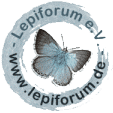

 +6Kontinente:EUAS
+6Kontinente:EUAS2. Diagnose
2.1. Männchen
2.2. Genitalien
2.2.1. Männchen
2.3. Erstbeschreibung
4. Weitere Informationen
4.1. Andere Kombinationen
- Lita cervinella Eversmann, 1844 [Originalkombination]
4.2. Synonyme
- Dirhinosia trifasciella Rebel, 1905 [Nr. 03357 in Karsholt & Razowski (1996); synonymisiert durch Tokár & Gozmány (2004)]
4.3. Faunistik
Nach der [Fauna Europaea] kommt die Art in Bulgarien, Ungarn, in der Ukraine und im Osten und Süden des europäischen Teils von Russland vor. Tokár & Gozmány (2004: 69) umreißen das Verbreitungsgebiet mit " Russia (Southern Ural, Lower Volga) (Anikin & Piskunov 1995), Ukraine (Luganskaya oblast) (Bidzilya & Budashkin 1998), Hungary, Bulgaria, Croatia (Dalmatia) (Meess 1910), Turkey." Sie geben noch den Hinweis: "The first record of Dirhinosia cervinella in Central Europe (Hungary, Gyöngyös) was identified mistakenly as Chionodes lugubrella (Fabricius, 1794) (Buschmann 2000). D. cervinella resembles lugubrella externally, but the ground colour of the forewing of the latter is dark brown without any yellowish or reddish tinge."
4.4. Typenmaterial
Tokár & Gozmány (2004: 69) schreiben zum von ihnen untersuchten Typenmaterial:
"Syntypes Lita cervinella Evm. (Lectotype not designated), 5 ♂♂, 3 ♀♀ (3 ♂♂ and 1 ♀ without abdomen), Spasskoe [Orenburskaya oblast], leg. E. Eversmann, teste A. Lvovsky (coll. ZIAP).
Additional material examined. Bulgaria: “Holotype ♀ Dirhinosia trifasciella Rebel, Rilo Monast[ir], 24.VII.1902, Rebel, teste K. Sattler, 1966, Mus. Vind. Gen. Präp. 3435” (coll. NHMW)".
(Autor: Erwin Rennwald)
4.5. Literatur
- Erstbeschreibung: Eversmann, E. (1844): Fauna lepidopterologica volgo-uralensis exhibens lepidopterorum species quas per viginti quinque annos in provinciis Volgam fluvium inter et montes Uralenses sitis observavit et descripsit. I-XIV, 1-633. Casani (typis universitatis) [Digitalisat von Google Books im Viewer der Hathi Trust Digital Library].
- Tokár, Z. & L. Gozmány (2004): Review of the Palaearctic species of Dirhinosia Rebel, 1905 (Lepidoptera, Gelechiidae). — Acta Zoologica Academiae Scientiarum Hungaricae 50 (1): 63-74 [PDF auf actazool.nhmus.hu].











